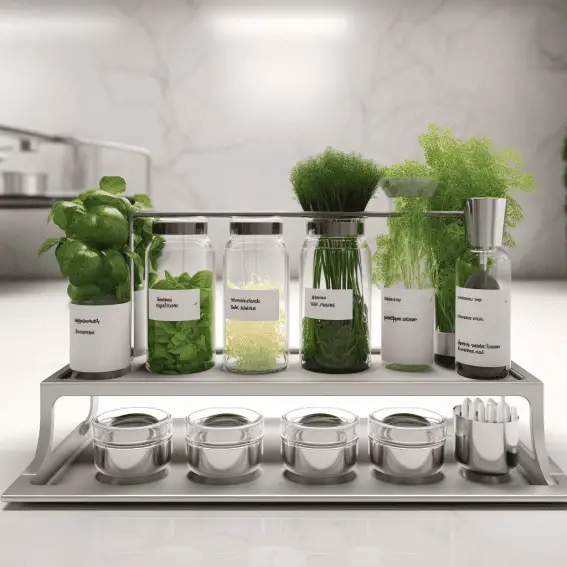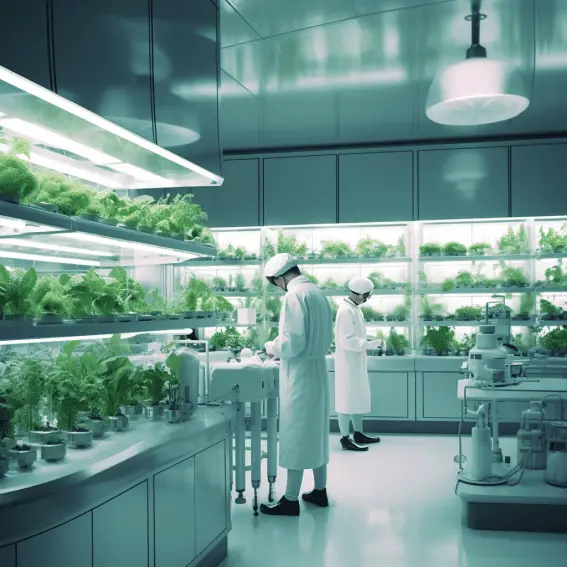
If you’re looking for a way to grow plants indoors or in small spaces, hydroponics might be the solution.
But did you know that using organic nutrients in your hydroponic setup can improve plant growth even further?
In this article, you will discover the benefits of organic nutrients for hydroponics and how they differ from non-organic options.
Organic nutrients come from natural sources like compost, animal manure, or bone meal.
They are not chemically synthesized and often contain essential micronutrients that plants need to thrive.
When used in hydroponics, organic nutrients can provide a more balanced and sustainable approach to growing plants.
By avoiding synthetic chemicals, you can reduce the risk of chemical buildup and create a healthier environment for both your plants and yourself.
So let’s dive into the world of organic hydroponic nutrients and discover how they can help you achieve optimal plant growth.
KEY TAKEAWAY
What to know about organic nutrients for hydroponics?
Organic nutrients for hydroponics offer numerous benefits, including improved plant growth, environmental sustainability, and the production of healthy and nutritious crops without the use of synthetic chemicals.
Can organic hydroponic nutrients improve plant growth?
Organic hydroponic nutrients can drastically enhance plant growth, so don’t miss out on their amazing benefits! When it comes to hydroponics, using organic nutrients can provide a range of advantages over non-organic alternatives.
One of the main benefits is that organic nutrients contain a wider range of micronutrients and trace elements that are essential for healthy plant growth. (1)
Not only do organic nutrients contain a more diverse range of minerals, but they also release these nutrients at a slower rate than non-organic options.
This means that plants have access to a steady supply of all the necessary minerals they need for optimal growth.
Additionally, because organic hydroponic nutrients are derived from natural sources such as fish or bone meal, they often contain beneficial bacteria and fungi which can help improve root health and nutrient uptake.
Using organic hydroponic nutrients has been shown to improve overall plant health and increase yields compared to using non-organic options.
For more details about hydroponic nutrient, check out the nutrient guide.
In the next section, we will explore in more detail what sets these two types of nutrients apart and how they impact plant growth differently.
What are the differences between organic and non-organic hydroponic nutrients?
While non-organic hydroponic nutrients may be cheaper, they often lack essential micronutrients found in organic options.
Organic hydroponic nutrients are derived from natural sources such as seaweed, fish emulsion, and bone meal.
These natural sources contain a variety of micronutrients, such as iron, copper, zinc, and manganese, necessary for plant growth and development.
Non-organic hydroponic nutrients typically rely on synthetic substances to provide plants with necessary macronutrients like nitrogen, phosphorus, and potassium.
While these synthetic compounds can be effective in promoting plant growth initially, they do not offer the same long-term benefits as organic options.
Organic hydroponic nutrients provide a more complete nutrient profile that promotes healthy root development and better overall plant health.
In addition to their superior nutrient profiles, organic hydroponic nutrients are also better for the environment.
Non-organic options often contain harmful chemicals that can leach into groundwater or damage nearby ecosystems if not disposed of properly.
By using organic alternatives instead of synthetic ones, you can help reduce your environmental impact while still improving your crop yield.
When it comes to using hydroponic nutrients effectively in gardening, there are several factors to consider, including pH levels and nutrient ratios.
By carefully monitoring these variables and selecting the right combination of organic supplements for your plants’ needs, you can ensure optimal growth and maximum yields without relying on harmful chemicals or expensive fertilizers. (2)
With proper care and attention to detail, even novice gardeners can achieve impressive results using organic hydroponic nutrients in their gardens.
How can hydroponic nutrients be effectively used in gardening?
To effectively use hydroponic nutrients in your garden, you need to closely monitor pH levels and nutrient ratios.
The first step is to measure the pH level of your water and adjust it to the optimal range for your plants.
Most hydroponic nutrients work best in a pH range of 5.5-6.5, so ensure that your water falls within this range.
Next, you need to mix the nutrients according to the instructions on the label or as recommended by your supplier.
It’s important not to overfeed or underfeed your plants, so pay attention to the recommended ratios and adjust accordingly based on how your plants respond.
Make sure that you maintain proper water temperature and circulation.
Water that’s too cold can slow down plant growth while stagnant water can lead to root rot.
A good rule of thumb is to keep the water temperature between 65-75°F and circulate it at least twice an hour.
Now that you know how to effectively use hydroponic nutrients in your garden, let’s explore where you can find reliable sources to purchase these products from.
Where can I find reliable sources to purchase hydroponic nutrients?
You can easily find reliable sources to purchase hydroponic nutrients online or at your local gardening store, and they’ll provide you with everything you need to grow healthy and vibrant plants.
When looking for sources, make sure to read reviews and compare prices to ensure that you’re getting a good deal.
Some popular brands of hydroponic nutrients include General Hydroponics, Botanicare, and FoxFarm.
If you prefer shopping online, there are many websites that specialize in selling hydroponic supplies.
These sites often offer a wider selection of products than brick-and-mortar stores, as well as competitive pricing.
Some top online retailers for hydroponic nutrients include Amazon, Hydrobuilder, and GrowAce.
Ultimately, where you choose to buy your hydroponic nutrients will depend on your personal preferences and available resources.
Just be sure to do your research beforehand so that you can make an informed decision about which products will work best for your garden.
As for whether hydroponics is considered an organic method of gardening? That’s a topic we’ll explore in the next section.
Is hydroponics considered an organic method of gardening?
Hydroponic gardening is a unique method that challenges traditional notions of organic farming.
While the use of artificial mediums and controlled environments may seem like it goes against the principles of organic gardening, hydroponics can still be considered an organic method.
Hydroponic systems make use of nutrient-rich solutions that are formulated with natural ingredients such as seaweed extract, fish emulsion, bone meal, and other organic materials.
The lack of soil in hydroponics also eliminates the need for pesticides or chemical fertilizers, which can harm both the environment and human health.
Additionally, hydroponic gardening allows for precise control over growing conditions such as pH levels and nutrient concentrations, resulting in healthier plants with higher yields.
Overall, while hydroponics may not fit into traditional ideas of organic farming methods due to its use of artificial mediums and technology, it still utilizes natural ingredients and eliminates harmful chemicals.
Moving onto our next topic – how does hydroponics compare to traditional soil-based gardening?
How does hydroponics compare to traditional soil-based gardening?

Get ready to explore the differences between hydroponic and traditional soil-based gardening.
Hydroponics involves growing plants in nutrient-rich water, without using any soil.
On the other hand, traditional soil-based gardening relies on natural resources like sunlight, water, and fertile soil for plant growth.
Hydroponics offers several advantages over traditional gardening methods.
Firstly, it uses less water than soil-based gardening since the nutrients can be recycled through a closed system.
This also means that there is less risk of pests and diseases spreading from contaminated soil.
Additionally, hydroponics allows for year-round cultivation of crops and multiple harvests per season due to its controlled environment.
However, one downside to hydroponic gardening is that it requires more energy input to maintain the necessary temperature and lighting conditions compared to outdoor gardens.
Additionally, there is a higher initial cost associated with setting up a hydroponic garden due to equipment costs such as pumps and grow lights.
As you can see, both hydroponic and traditional gardening methods have their own set of advantages and disadvantages.
Now let’s move onto the next section where we will explore what role did hydroponics play in the green revolution?
What role did hydroponics play in the Green Revolution?
Now, let’s dive into how hydroponics played an instrumental role in the Green Revolution by thinking outside the box.
The Green Revolution was a period of remarkable agricultural development that took place from the 1940s to the 1960s.
During this time, farmers were facing challenges like never before as crop yields were dwindling and food shortages loomed large.
Hydroponics offered a novel solution to these problems by allowing for year-round cultivation of crops in a controlled environment.
The following are four ways in which hydroponics contributed to the Green Revolution:
1.
Hydroponics allowed for increased crop yields: In traditional soil-based farming, only a fraction of nutrients reach the plants’ roots due to soil erosion and leaching.
However, with hydroponics, all essential nutrients are provided directly to the plant’s roots through nutrient-rich water.
This results in higher crop yields per square foot than conventional farming methods.
2.
Hydroponic systems reduce water usage: As compared to traditional soil-based agriculture, hydroponic systems use up to 90% less water because they recycle water through closed-loop systems.
3.
Control over pests and diseases: With hydroponics, growers can maintain a clean growing environment that is free from pests and diseases since no soil is involved.
4.
More efficient land use: Since hydroponic systems do not require arable land or fertile topsoil, it allows farmers to grow crops vertically or on rooftops instead of horizontally on farmland.
Understanding how hydroponics played such an essential role in revolutionizing agriculture is crucial for appreciating its importance today as well as its potential for future growth.
Now that you’ve learned about how hydroponic systems work on a large-scale level, let’s delve into what it means when plants grown using this method are labeled ‘organic.’
What does it mean for a plant to be labeled as organic in hydroponics?
Now that you know how important hydroponics was in the Green Revolution, let’s talk about organic labeling in hydroponics.
When a plant is labeled as organic, it means that it has been grown without the use of synthetic fertilizers or pesticides.
Instead, farmers rely on natural methods to provide plants with nutrients and protect them from pests.
In hydroponics, this can be achieved by using organic nutrients, such as compost tea or fish emulsion.
These natural sources of nutrients are broken down by microorganisms in the water and made available to your plants.
Not only does this promote healthy growth for your plants, but it also helps maintain a balanced ecosystem within your hydroponic system.
Using organic methods in hydroponics is not only better for the environment but can also lead to healthier and more flavorful crops.
With no harmful chemicals used during growth, you can feel good about consuming produce that was grown sustainably and with care for both you and the planet.
Conclusion
Congratulations on learning about the benefits of organic hydroponic nutrients! By using organic nutrients, you can improve plant growth and yield while also promoting a healthy environment.
The main differences between organic and non-organic hydroponic nutrients are the source of the ingredients used to create them.
Organic hydroponic nutrients are made from natural sources like kelp, fish emulsion, and bone meal, while non-organic options often contain synthetic chemicals.
To effectively use hydroponic nutrients in gardening, it’s important to follow the instructions carefully and monitor your plants regularly for signs of nutrient deficiencies or excesses.
You can find reliable sources to purchase hydroponic nutrients by doing research online or asking for recommendations from other experienced growers.
Hydroponics is considered an organic method of gardening as long as the nutrients used are derived from natural sources.
When comparing hydroponics to traditional soil-based gardening, there are pros and cons to both methods depending on your goals and resources.
One metaphor that can illustrate the deeper meaning behind using organic hydroponic nutrients is that they act as a ‘vitamin supplement’ for your plants.
Just like how taking vitamins can improve our health and well-being, providing organic nutrients to our plants can help them grow stronger and more resilient.
By choosing organic options, we’re not only benefiting our plants but also supporting sustainable agriculture practices that prioritize environmental health.
So why not give your plants that extra boost with some organic hydroponic nutrients?
Frequently Asked Questions
Are organic hydroponic nutrients more expensive than non-organic ones?
Organic hydroponic nutrients can sometimes be more expensive than non-organic ones, but it really depends on the specific brand and formulation.
Just like when you’re shopping for groceries, organic products tend to have a higher price tag because of the additional care and resources required for their production.
However, it’s important to consider the long-term benefits of using organic hydroponic nutrients.
They are derived from natural sources and are free from synthetic chemicals, pesticides, and genetically modified organisms (GMOs).
This means that they can contribute to a healthier and more sustainable growing environment for your plants.
So, while you may have to spend a little more upfront, you’re investing in the overall well-being of your plants and the quality of your harvest.
Can I use organic hydroponic nutrients in any type of hydroponic system?
The great thing about organic hydroponic nutrients is that they can be used in any type of hydroponic system.
Whether you’re using a nutrient film technique (NFT) system, deep water culture (DWC), or ebb and flow system, organic nutrients can be easily incorporated into your setup.
They come in various forms such as liquid concentrates or powdered mixes, which can be dissolved in the water reservoir of your hydroponic system.
Just make sure to follow the instructions provided by the manufacturer for the appropriate dosage and application method.
It’s also a good idea to regularly monitor your nutrient solution’s pH and conductivity levels to ensure optimal nutrient uptake by your plants.
If you’re looking to save some money while still incorporating organic practices into your hydroponic setup, you can also consider making your own organic nutrient solutions.
There are many DIY recipes available online that utilize common household items like compost, seaweed extract, and fish emulsion.
These homemade solutions can be a cost-effective alternative to store-bought organic hydroponic nutrients.
Just remember to properly research and adjust the nutrient ratios to meet the specific needs of your plants.
In conclusion, while organic hydroponic nutrients may come with a slightly higher price tag, they offer numerous benefits for your plants and the environment.
They can be used in any type of hydroponic system and provide a natural and sustainable approach to plant nutrition.
Whether you choose to purchase organic nutrients or make your own, it’s important to prioritize the health and vitality of your plants by providing them with the best possible nutrient solution.
Happy growing!
How often should organic hydroponic nutrients be applied to plants?
How often should organic hydroponic nutrients be applied to plants? Well, my friend, when it comes to feeding your plants, it’s all about finding that sweet spot.
Just like we humans need a balanced diet to stay healthy, our leafy friends also need a regular dose of nutrients to thrive.
But with organic hydroponic nutrients, things are a little different.
You see, organic nutrients are like the slow and steady marathon runners of the plant world.
They release their goodness over time, giving your plants a steady supply of nourishment.
So, how often should you apply these organic hydroponic nutrients? It’s recommended to follow the instructions provided by the manufacturer, as they know their products best.
However, as a general rule of green thumb, you can usually apply organic hydroponic nutrients every 1-2 weeks.
This ensures that your plants receive a consistent supply of essential vitamins and minerals to support their growth.
Can organic hydroponic nutrients help prevent nutrient deficiencies in plants?
Now, let’s talk about nutrient deficiencies.
Just like we can feel a little low on certain vitamins, plants can also experience nutrient deficiencies.
But fear not, because organic hydroponic nutrients can come to the rescue! These organic wonders are packed with all the good stuff that plants need to stay strong and healthy.
By using organic hydroponic nutrients, you can help prevent nutrient deficiencies in your plants and keep them in tip-top shape.
Remember, my friend, healthy and happy plants are the result of proper care and nourishment.
So, make sure you follow the recommended application frequency for organic hydroponic nutrients, and your plants will thank you with vibrant growth and bountiful harvests.
Happy gardening!
References
- https://hydroponicway.com/10-advantages-organic-hydroponic-nutrients-kratky-method#:~:text=Using%20organic%20nutrients%20in%20Kratky,efficiently%2C%20increasing%20growth%20and%20yield.
- https://www.hydroexperts.com.au/buying/resource-library/nutrients-additives/hydroponic-vs-organic-nutrients-whats-the-differen/#:~:text=To%20put%20it%20simply%2C%20hydroponic,they%20work%20in%20different%20ways.
Related Articles
- https://tophydroponicgarden.com/nutrients/
- https://tophydroponicgarden.com/hydroponic-nutrient-guide/
Was this helpful?

Crystal Erickson is an agriculture enthusiast and writer with a passion for sustainable farming practices and community development. Growing up on a family farm in rural Iowa, Crystal developed a love for the land and a deep appreciation for the hard work and dedication required to make a farm successful.
After completing a degree in Agriculture and Environmental Science from Iowa State University, Crystal began her career as an agricultural journalist, covering stories and issues related to modern farming practices, crop management, and livestock production. She quickly established herself as a respected voice in the industry, known for her insightful reporting and thoughtful analysis.
Over the years, Crystal has written for a variety of publications, including Farm Journal, Successful Farming, and Modern Farmer, as well as contributing to several academic journals focused on sustainable agriculture and community development. Her work has been recognized with numerous awards, including the Iowa Farm Bureau’s Young Farmer Achievement Award and the National Association of Farm Broadcasting’s Farm Broadcaster of the Year.

